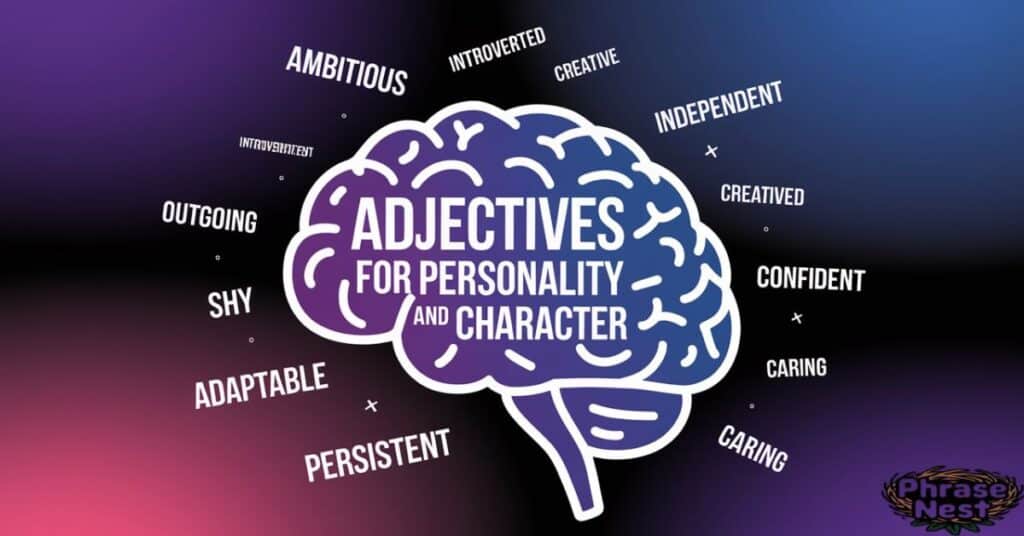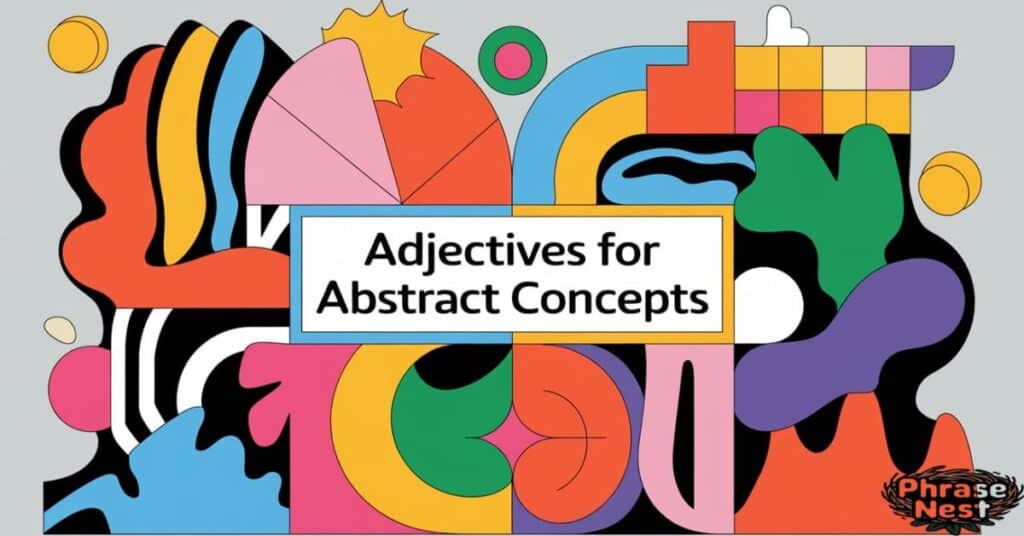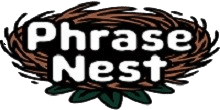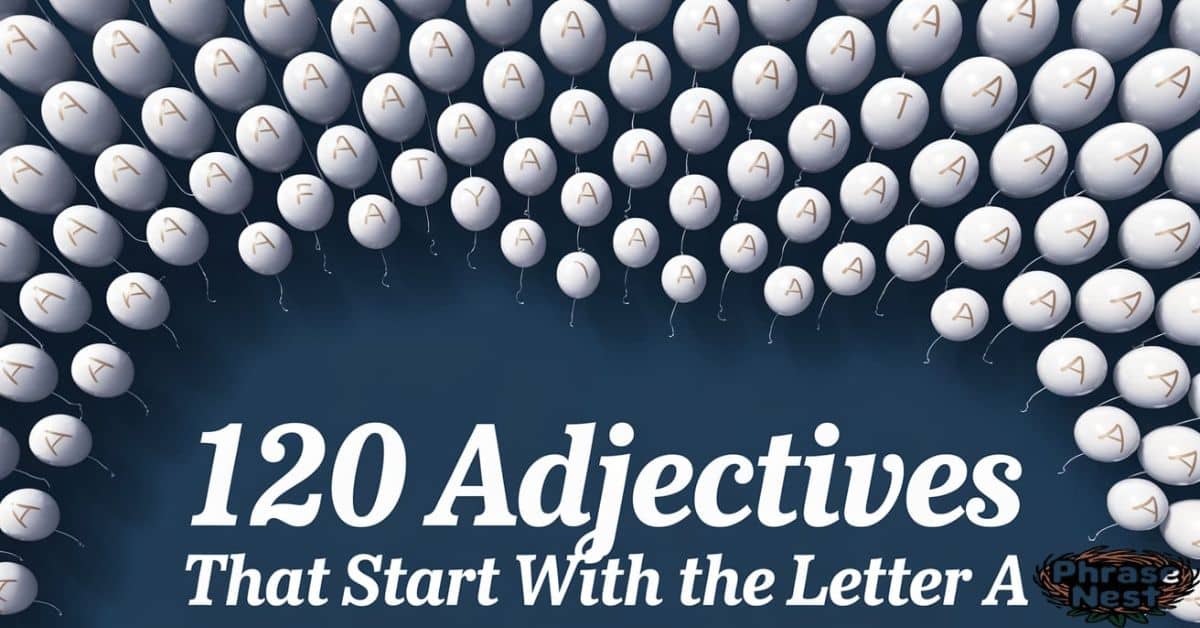Adjectives that start with A are some of the most versatile and vibrant words in the English language—and you’re about to discover just how powerful they can be! Whether you’re describing a breathtaking “adventurous” journey, an “authentic” personality, or an “astonishing” moment, these A-words add life and color to your conversations and writing.
Have you ever struggled to find the perfect word to express yourself? Well, you’re in the right place. This article is packed with exciting adjectives that will not only expand your vocabulary but also help you communicate with precision and flair. Let’s dive in!
Why Adjectives Matter
Adjectives do more than just describe—they evoke emotions, create vivid imagery, and make communication memorable. For instance, calling someone “amazing” feels different from calling them “adequate,” right? With the right adjective, you can transform a sentence, spark a feeling, or paint a picture in someone’s mind.
The letter A offers a treasure trove of adjectives, ranging from positive and uplifting to neutral and even challenging. Let’s explore these adjectives, categorized to make it easy for you to find the perfect one for any situation.
Positive Adjectives That Start with A
When you want to express positivity, these adjectives will help you spread cheer, encouragement, or admiration.
- Affectionate – Showing warmth and fondness.
- Ambitious – Driven to succeed or achieve goals.
- Adventurous – Bold and willing to take risks.
- Authentic – Genuine and real, not fake.
- Artistic – Creative and skilled in arts.
- Astounding – Amazingly impressive or surprising.
- Admirable – Worthy of respect or admiration.
- Attentive – Paying close attention to details.
- Amazing – Causing great wonder or admiration.
- Approachable – Friendly and easy to talk to.
Real-Life Example:
Imagine meeting someone new at a party. Describing them as “approachable” or “affectionate” immediately sets a positive tone, helping you see them in a warm light.
Neutral Adjectives That Start with A
Sometimes, you need adjectives that describe without leaning too heavily into positivity or negativity. These neutral terms are versatile and widely applicable.
- Average – Typical or ordinary.
- Ample – More than enough in size or amount.
- Available – Ready for use or accessible.
- Adjacent – Next to or near in space.
- Angular – Having sharp angles or edges.
- Annual – Happening once a year.
- Actual – Real and existing.
- Academic – Related to education or learning.
- Acceptable – Satisfactory or adequate.
- Analytical – Skilled at breaking down information.
Real-Life Example:
In academic writing, you might describe research findings as “acceptable” or “analytical.” These adjectives convey information clearly without unnecessary embellishment.
Challenging or Negative Adjectives That Start with A
Language also helps us describe difficult situations or emotions. These adjectives might have a negative connotation but are valuable for expressing challenges with precision.
- Arrogant – Overly proud or self-important.
- Apathetic – Showing little or no emotion or interest.
- Aloof – Distant or uninvolved.
- Annoying – Causing irritation or frustration.
- Awkward – Lacking grace or causing discomfort.
- Anxious – Feeling nervous or worried.
- Aggressive – Forceful or hostile.
- Ashamed – Feeling guilt or embarrassment.
- Absentminded – Forgetful or distracted.
- Antagonistic – Opposing or hostile.
Real-Life Example:
If someone cuts you off in traffic, you might describe their behavior as “aggressive” or “annoying.” These adjectives allow you to articulate frustrations constructively.
Adjectives for Appearance and Style
The way someone or something looks is often the first thing we notice. Use these adjectives to describe appearances with accuracy and flair.
- Attractive – Pleasing to the eye or appealing.
- Athletic – Fit and physically strong.
- Ageless – Timeless or not showing age.
- Adorned – Decorated or embellished.
- Alluring – Powerfully charming or enticing.
- Aesthetic – Concerned with beauty or artistic taste.
- Angular – Sharp or defined in shape.
- Apparent – Clearly visible or understood.
- Appealing – Pleasing or inviting.
- Apprehensive – Hesitant or uneasy about something.
Real-Life Example:
Describing a piece of art as “aesthetic” or someone’s clothing as “adorned” highlights their visual appeal in a sophisticated way.
Adjectives for Abilities and Skills
When discussing talents or abilities, these adjectives can help you recognize and celebrate strengths.
- Able – Having the skill or means to do something.
- Accomplished – Highly skilled or successful.
- Adaptable – Able to adjust to new situations.
- Agile – Quick and graceful in movement.
- Astute – Sharp and perceptive.
- Alert – Quick to notice and respond.
- Analytical – Skilled at logical reasoning.
- Articulate – Able to express thoughts clearly.
- Attentive – Focused and observant.
- Adequate – Sufficient for a specific purpose.
Real-Life Example:
In a professional context, describing a colleague as “adaptable” or “articulate” highlights their strengths in a respectful and clear manner.
Adjectives for Personality and Character

When describing someone’s personality, these adjectives help you capture their essence, whether they’re charming, complex, or somewhere in between.
- Amiable – Friendly and good-natured.
- Assertive – Confident and self-assured.
- Altruistic – Selflessly concerned for others.
- Authentic – True to oneself; genuine.
- Adaptable – Flexible and able to adjust easily.
- Adventurous – Willing to try new things.
- Astute – Clever and perceptive.
- Affable – Easygoing and pleasant in manner.
- Amicable – Displaying goodwill or friendliness.
- Approachable – Easy to interact with or talk to.
Example:
You might describe a great leader as assertive and altruistic, balancing confidence with care for others.
Descriptive Adjectives for Nature and the Environment
Nature is full of beauty and wonder, and these adjectives are perfect for describing the world around us.
- Arid – Extremely dry or lacking moisture.
- Abundant – Plentiful or overflowing.
- Azure – Bright blue, like a clear sky.
- Alpine – Relating to high mountains.
- Alive – Full of life or energy.
- Autumnal – Relating to autumn or fall.
- Alluvial – Pertaining to soil or deposits left by flowing water.
- Airy – Light and spacious, like air.
- Aromatic – Having a pleasant, noticeable smell.
- Aqueous – Relating to or resembling water.
Example:
A hike through arid deserts or alpine peaks can feel refreshing when paired with an azure sky.
Adjectives for Feelings and Emotions
Finding the right word to capture emotions can be tricky, but this list will help you articulate feelings with greater accuracy.
- Anxious – Nervous or uneasy.
- Aggrieved – Feeling wronged or unfairly treated.
- Apprehensive – Worried about something bad happening.
- Awestruck – Filled with wonder or amazement.
- Anguished – Experiencing severe pain or distress.
- Affectionate – Showing fondness or love.
- Appalled – Shocked or horrified.
- Ambivalent – Having mixed feelings.
- Ashamed – Feeling guilt or embarrassment.
- Adoring – Showing deep love or admiration.
Example:
Standing before a towering waterfall might leave you awestruck, while a heartfelt reunion could feel deeply adoring.
Adjectives for Size and Shape
Describing the size, shape, or form of things often requires precise words. These adjectives will help you bring clarity to your descriptions.
- Angular – Having sharp corners or edges.
- Ample – Generously sized.
- Asymmetrical – Lacking symmetry or balance.
- Apt – Fitting or appropriate in size or proportion.
- Arched – Curved like an arch.
- Aerodynamic – Designed to minimize air resistance.
- Abrupt – Sudden and steep.
- Angular – Thin and bony in appearance.
- Adjoining – Next to or connected with.
- Aesthetic – Pleasing in appearance or style.
Example:
The aesthetic design of a building with arched windows and ample space makes it visually striking.
Adjectives for Situations and Circumstances
Whether describing events, interactions, or conditions, these adjectives give you the ability to explain situations more vividly.
- Adverse – Harmful or unfavorable.
- Auspicious – Indicating future success; fortunate.
- Alarming – Causing worry or fear.
- Affirmative – Agreeing or supportive.
- Ad hoc – Made or done for a specific purpose.
- Ambiguous – Open to multiple interpretations.
- Arbitrary – Based on random choice or whim.
- Atypical – Not representative of a type; unusual.
- Advantageous – Beneficial or favorable.
- Anticipated – Expected or foreseen.
Example:
A sudden storm may create adverse conditions, but the auspicious clearing of the sky afterward can bring relief.
Adjectives for Taste and Texture
Foodies and sensory enthusiasts alike will love these adjectives for describing flavors, textures, and culinary experiences.
- Appetizing – Appealing to the appetite.
- Acidic – Sharp, sour, or tart in taste.
- Astringent – Slightly bitter or sharp.
- Aromatic – Having a strong, pleasant smell.
- Airy – Light and fluffy in texture.
- Ashy – Dry and powdery, like ash.
- Alkaline – Having a basic (non-acidic) taste or quality.
- Arid – Dry or lacking in moisture.
- Aged – Matured for a specific flavor, like cheese or wine.
- Ample – Generous in size or portion.
Example:
A slice of aged cheddar paired with an aromatic glass of wine creates an appetizing combination.
Adjectives for Abstract Concepts

Abstract ideas and qualities often need carefully chosen adjectives to describe them. These words will help you communicate complex thoughts.
- Absolute – Complete and total.
- Abstract – Existing in thought but not physical form.
- Ambiguous – Open to more than one interpretation.
- Arbitrary – Based on personal whim rather than reason.
- Axiomatic – Self-evident or universally accepted.
- Archaic – Old-fashioned or no longer in use.
- Analytical – Logical and methodical.
- Amorphous – Lacking a clear shape or form.
- Ardent – Passionate or enthusiastic.
- Apathetic – Lacking interest or enthusiasm.
Example:
A philosophical debate might explore abstract ideas that seem amorphous yet axiomatic in their truth.
Quiz: Test Your Knowledge of Adjectives That Start with A
Here’s a fun quiz to test what you’ve learned from the article! Each question is multiple-choice, and the correct answer is provided after each question.
1. Which of the following adjectives is commonly used to describe someone who is friendly and easygoing?
a) Aloof
b) Affable
c) Anxious
d) Arbitrary
Answer:
b) Affable
Affable means someone who is easygoing and pleasant in manner, making them approachable and friendly.
2. Which adjective would best describe a dry and moisture-deprived landscape?
a) Alpine
b) Abundant
c) Arid
d) Aromatic
Answer:
c) Arid
Arid is used to describe extremely dry conditions, often associated with deserts or droughts.
3. If someone is described as “altruistic,” what does it mean?
a) They are selflessly concerned for others.
b) They are hesitant or unsure.
c) They are creative and artistic.
d) They are overly proud of themselves.
Answer:
a) They are selflessly concerned for others.
Altruistic refers to a person who puts the needs of others before their own, showing selflessness.
4. Which of the following adjectives would you use to describe food with a sharp or sour taste?
a) Acidic
b) Airy
c) Ambiguous
d) Ample
Answer:
a) Acidic
Acidic is used to describe sharp, sour, or tart flavors, often found in citrus fruits like lemons.
5. What does the adjective “apprehensive” mean?
a) Feeling excited and overjoyed.
b) Feeling nervous or worried about something bad happening.
c) Feeling indifferent or uninterested.
d) Feeling certain and confident about success.
Answer:
b) Feeling nervous or worried about something bad happening.
Apprehensive refers to a state of anxiety or worry, often about an anticipated event.
Closing Thoughts: The Power of Adjectives
Adjectives are the unsung heroes of language. They shape how we see the world and communicate our experiences. From describing a breathtaking view as “amazing” to expressing frustration with “awkward” situations, adjectives allow us to connect with others on a deeper level.
Take a moment to reflect on your own vocabulary—how often do you use adjectives to express yourself more vividly? Why not challenge yourself to incorporate some of the words from this list into your daily conversations or writing?

Annie Bellish, an author at Phrasenest.com, brings clarity and precision to her articles on grammar and language. Known for her insightful, articulate, and concise writing, she simplifies intricate grammar rules and shares practical tips. Annie’s passion for language shines through her engaging content, helping readers express themselves with confidence and eloquence.

